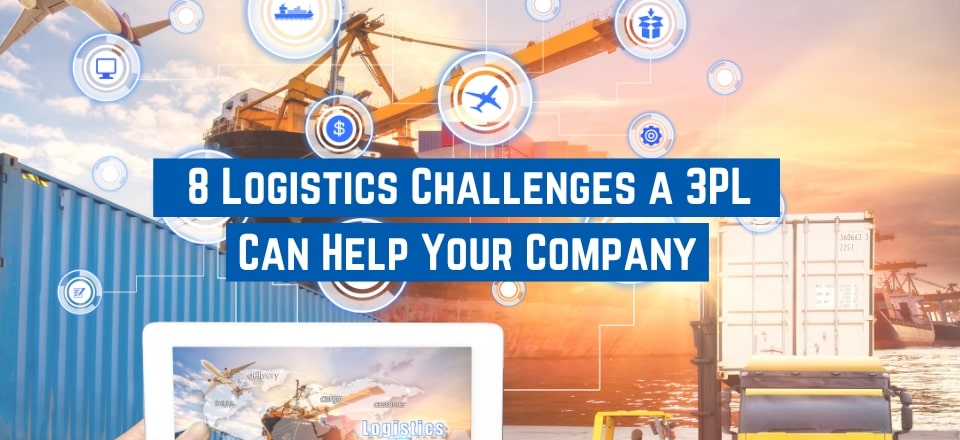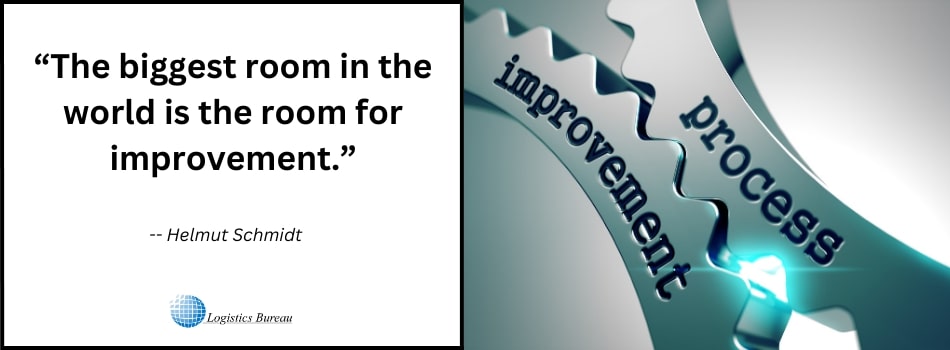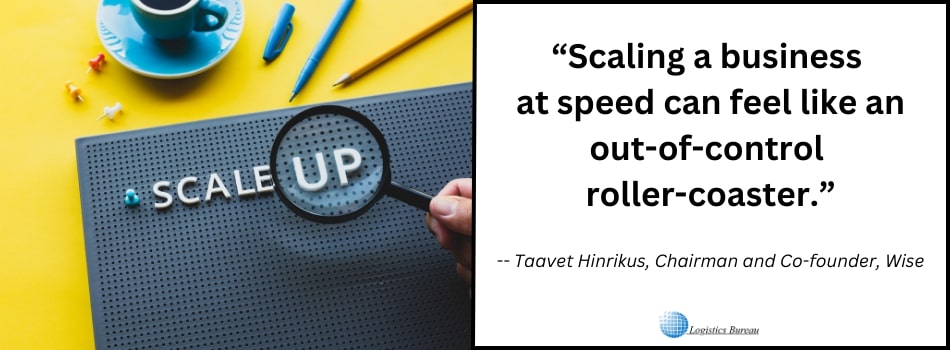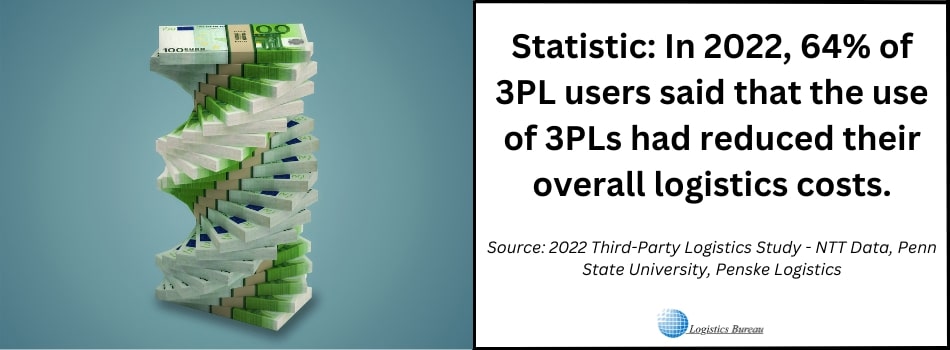Effective supply chain management is often beset with challenges in today’s dynamic business landscape. As your enterprise grows or market conditions change, it may become evident that your organisation can benefit from partnering with a third-party logistics (3PL) provider.
Of course, here at Logistics Bureau, we know the signs of a company in need of third-party assistance, but can you recognise those same indications in your business?
If not, this post should help, because we’re highlighting several logistics challenges that 3PL outsourcing can often help businesses to overcome.
Let’s begin with a challenge that often frustrates leaders of companies in the startup phase, especially smaller organisations—how to access dedicated logistics expertise, resources, and infrastructure.
The Challenge: How to do Logistics When it’s a Distraction
For many startups, logistics is absent from, or lying very low on, the initial list of priorities for investment due to the focus on developing a functional business and attracting customers. If you’re a leader in a startup, you know that logistics services are likely to be a key requirement. Nevertheless, because other business functions must be up and running first, you may have postponed the strategy for accessing those services until later on.
If that’s the case, and “later on” has arrived, you’re probably managing your shipping through parcel or LTL freight services, renting vans or trucks, or are simply at the point where you’re thinking seriously about logistics strategy
It could also be that the people doing the thinking, or managing logistics, are not dedicated logistics professionals and are just wearing an additional hat on top of their regular raft of responsibilities.
We’ll take all the above back if you have your company’s logistics entirely organised, and if that’s the case, you may not need the advice in these paragraphs. However, if you find that the need to manage logistics is distracting your employees from the tasks they were originally hired for, outsourcing to a 3PL could improve your situation.
A 3PL Can Lighten Your Logistics Load
The best 3PL providers have the expertise, resources, technology, and scale to handle all your logistics execution needs, from the first mile (shipping from your production/manufacturing facilities to a warehouse or distribution centre) through storage, order fulfilment, all the way to distribution and last-mile delivery.
That doesn’t necessarily mean that you can abstain from logistics management entirely. You will still need a hand on the tiller to define logistics strategy, manage the relationship with the 3PL provider, and monitor performance. However, you will not endure the burden of acquiring and managing logistics assets or directly controlling warehousing and transportation activity.
Logistics will become much less of a distraction, your employees can return to wearing just one hat apiece, and you won’t need to think about the costs and complications of hiring dedicated logistics staff.
Indeed, for many startups, a 3PL partner can make the difference between success and failure, supporting the former by taking on the logistics processes and freeing the client’s internal resources to focus on achieving growth.
Is a 3PL Right for Your Business? The Importance of Analysis
However, 3PL outsourcing is not necessarily the best option for every company, so you must thoroughly weigh the pros and cons before committing. That analysis alone can seem daunting if your enterprise is not especially logistics savvy.
The team at Logistics Bureau has been helping companies make insourcing/outsourcing decisions for more than two decades. We can help you objectively assess the benefits and drawbacks of working with a 3PL and help you find and engage one if you decide to outsource logistics.
To find out more, please don’t hesitate to book a free consultation call with one of our outsourcing experts. You can do so quickly and easily by clicking the button below.
Need help with insourcing/outsourcing decisions? Book your free consultation.
The Challenge: Logistics Processes – Joining the Dots and Achieving Efficiency
What if your company is not a startup? It may be well established and enjoying growth but muddling along with limited logistics capabilities. Companies in that situation sometimes require help to achieve optimal supply chain efficiency because they have yet to graduate from fragmented logistics processes that limit visibility and hamper customer service.
You may have leased warehouses or opted for shared warehousing facilities while engaging several different forwarders for shipping and a range of carriers for distribution and delivery.
A 3PL partner can help you to remedy process fragmentation and its associated weaknesses. For example, you can ask your provider to assess your current processes, identify areas for improvement, and implement streamlined solutions to enhance overall efficiency.
The Challenge: How to Scale up Logistics Without Jeopardising Service
If your company has established itself in its sector, it has overcome one of the biggest hurdles to survival. The achievement is even more admirable if it did so without a 3PL partner. But what happens when you’re ready for the next big step—up-scaling the enterprise, whether that means adding new products, entering new markets, or simply growing through customer acquisition and sales increases?
Similar to the startup phase, during substantial growth, there may come a point where your existing logistics arrangements are no longer adequate, even if your processes are streamlined and efficient. Scaling up almost always requires new expertise, resources, and technology.
A 3PL Can Help You Scale as Necessary
As your logistics operation becomes strained by the demands of business growth, the last thing you need is to experience a degradation in customer service. Yet that often happens when companies cannot upgrade their logistics systems fast enough to keep up with increased supply chain throughput.
Partnering with a 3PL provider is one way to increase the scale of your logistics operation. Of course, you must be prepared to take some time to find a service provider that’s well matched to the size, culture, and needs of your business (as we explain in an earlier post on this blog, a guide to success with 3PLs, it’s a bad idea to rush the process).
But once you have done that, and secured the partnership, you can exploit your partner’s resources to scale up or down as necessary, without the complexities and costs involved in running and right-sizing operations internally—while also maintaining your focus on service excellence.
The Challenge: Expanding Your Enterprise into New Geographies
At some point, you might believe it’s time to consider expanding into markets outside your current locality, region, or country. To do so on an industrial scale—meaning that you wish to set up distribution facilities and establish a logistics network in the new geography—is no mean feat.
You will need to identify and connect with professionals familiar with the new geography, its challenges, and culture and who have the right contacts to help you set up your logistics operation. That might mean engaging consultants in the region or hiring staff to set up new business units.
You may need to send some of your local employees to the new market to oversee the setup, and you will require warehouse facilities strategically located to serve as cost-effective hubs for distribution. Then there will be decisions to make about fleet operations, or, for foreign markets, how to get your products into the country, or source them there, and then move them on to your customers.
Given that the above are only a few of the considerations for geographic expansion, it’s easy to acknowledge that a 3PL partnership is often the best approach.
How a 3PL Can Help You Enter New Markets
By working with a global 3PL, or at least one that operates in your target market, you can bypass many of the headaches–and costs—associated with such a venture.
The right partner will serve you well by helping you overcome the following challenges:
- Establishing distribution infrastructure
- Accessing local knowledge
- Acquiring and managing warehouse facilities
- Performing order fulfilment
- Accessing and/or managing transportation assets for import and distribution
- Navigating export/import and other logistics-related regulations
In many cases, 3PLs already have some infrastructure established that you can tap into, along with the local expertise and knowledge. They typically operate warehouses and distribution centres located strategically. They may own and manage truck fleets or be engaged in beneficial partnerships with reputable forwarders and carriers.
3PLs for Ecommerce Expansion
An increasing number of 3PLs specialise in e-commerce logistics, managing and executing order fulfilment for foreign clients, so if your company doesn’t wish to have physical outlets in the new market, you can keep all sales activity online, while maintaining a fully outsourced fulfilment and distribution operation there.
Above all, whether your new market is domestic or international, a third-party logistics provider will typically offer your company the fastest option to establish a supply chain and distribution network and enable you to start large-scale operations in the shortest possible time.
The Challenge: Overcoming Issues with Transportation
For large or small companies, startups, or long-established businesses, transportation issues can negatively impact costs, morale, and customer service. As a business leader, the last thing you want is to experience chronic problems in the flow of your materials and products.
If that’s a situation you’re facing as a logistics manager, executive, or business owner, you know that any delay in resolving it is costly. While it may be expensive to remedy the problem, at least you know it is money well spent, unlike that which is wasted as long as the scenario exists.
But what to do when you continually face difficulties with carrier management, shipment visibility, or attaining favourable freight rates? It can be like painting the Sydney Harbour Bridge, as you tackle issue after issue, only to see those same problems crop up again later.
A 3PL Can Improve Transportation Performance
For many businesses, handing logistics management and execution over to a 3PL is the most effective way to eliminate these headaches.
Aside from their expertise in logistics management, 3PLs typically have firmly established carrier relationships, people with strong skills in rate negotiation, and advanced digital tools to enhance supply chain visibility and improve logistics efficiency.
If your company finds persistent transportation issues tough to tackle and you are not sure if outsourcing to a 3PL might be the answer, the consulting team at Logistics Bureau can help. We’ll be pleased to assist you in evaluating a range of possible remedies and help you to implement them. To find out more, we invite you to get in touch to book a free consultation call.
Let’s discuss how we can help you with transportation challenges. Book a free consultation here.
The Challenge: Keeping Up with Technology Trends
Since we closed the section above by mentioning digital tools, let’s retain the focus on technology issues momentarily—because logistics today is heavily dependent on technological solutions.
Companies that lack such infrastructure often struggle to compete effectively because their better-equipped competitors enjoy more effective supply chain management, which translates into better general business performance.
Unfortunately, many organisations that could benefit from improved logistics technology integration find it impractical or prohibitively expensive to implement sophisticated TMS, WMS, tracking technology, and analytics tools.
If yours is one of those companies, you can instead access the same capabilities by partnering with a 3PL that has them and is willing to integrate them with your existing digital platforms or allow you direct access via web portals or similar interfaces.
The Challenge: Arresting an Upward Spiral in Logistics Costs<
Naturally, your company’s growth will be accompanied by rising logistics costs, but the increases can often be disproportionate and hard to control. As with some of the other challenges mentioned so far, this one is even tougher to overcome if logistics is not a core element of your business, so why not outsource to a company that exists purely to take care of shipping, warehousing, fulfillment, and logistics?
Under the right circumstances, a partnership with a third-party logistics provider can reduce your logistics costs or, if not, can put the brakes on uncontrolled increases, enabling your company to become more competitive and realise increased profit margins.
How a 3PL Can Help You Control Costs
The many ways in which a 3PL can help you get logistics costs under control include the following:
- Taking on the labour costs associated with logistics
- Exploiting their economies of scale to execute your logistics activities at less cost
- Negotiating lower freight rates than your company is likely to achieve
- Providing the transparency necessary to preempt and avoid problems and delays
- Applying appropriate technology to streamline processes and ensure efficiency
- Minimising inventory damage and loss – through the application of superior handling, storage, picking, packing, and transportation methodologies
- Optimising your logistics processes through appropriate consolidation, transport mode selection, and routing
That all adds up to plenty of potential for cost savings. However, it’s important to note that many companies find logistics costs initially increasing after commencing a partnership with a 3PL. With that in mind, it’s critical to consider the long-term rather than immediate value of outsourced logistics.
After all, it might be worth accepting slightly higher costs in the first instance, to secure greater cost control and minimise increases over the life of the partnership.
The Challenge: Inventory Management
In our experience as a consulting firm, effective inventory management is a challenge for every company that holds inventory. The larger your company becomes, the more complex the IM challenge. Typical problems in this area include:
- Inventory accuracy
- Inventory obsolescence
- Poor visibility
All the above problems impact stock availability and typically lead to gradually increasing buffer inventory levels, which ties up more and more working capital. It’s also fair to say that inventory availability issues are not merely an IM problem. They quickly translate into customer service issues.
A 3PL Can Simplify Your Inventory Management
What if your company faces difficulties raising IM effectiveness, and you don’t have or cannot acquire the necessary technology, expertise, or resources to optimise your inventory management? A 3PL partnership could be the most viable and practical solution.
A 3PL can help you regardless of whether you decide to place your inventory in its warehouses and distribution centres. For example, does your company already own or lease warehouses? If so, it might be possible to hand over the running of those facilities to your logistics provider.
However you decide to go about it, with inventory management as a core element of 3PL providers’ business, you should find that once you outsource, your provider will help you to optimise your inventory levels, improve the utilisation of warehouse space, maintain accurate inventory records, and reduce the need for high levels of buffer stock.
The Challenge: Knowing if 3PL Logistics is Right for Your Enterprise
To close this post, we want to mention one final challenge you can’t realistically expect a 3PL to solve. It’s the challenge of determining if your company should outsource as a solution to the issues discussed in this article—or to any other logistics challenges.
Outsourcing is not the ideal answer in every situation, and for those scenarios when it’s not, you don’t want to go to the time, trouble, and expense of inviting tenders and evaluating respondents. Furthermore, outsourcing to a 3PL is a long-term commitment, so you need to be sure it’s the right thing to do.
But it can be difficult to ascertain if a 3PL partnership is the best approach for your enterprise. That’s when an impartial assessment by our consulting team can help you to make the right decision.
To learn more about how we can guide and counsel you through evaluating solutions to these challenges, you need only contact us and book a free initial consultation.
Let’s discuss your logistics challenges, and afterward, we’ll explain how we can help you choose the most appropriate solution, whether that proves to be 3PL logistics outsourcing or some other selected measures.
Ready to discuss your logistics challenges and evaluate the options? Book your free consultation now.
Editor’s Note: The content of this post was originally published on Logistics Bureau’s website dated July 11, 2023, under the title “Struggling with Logistics Challenges? A 3PL Might be Your Salvation“.










